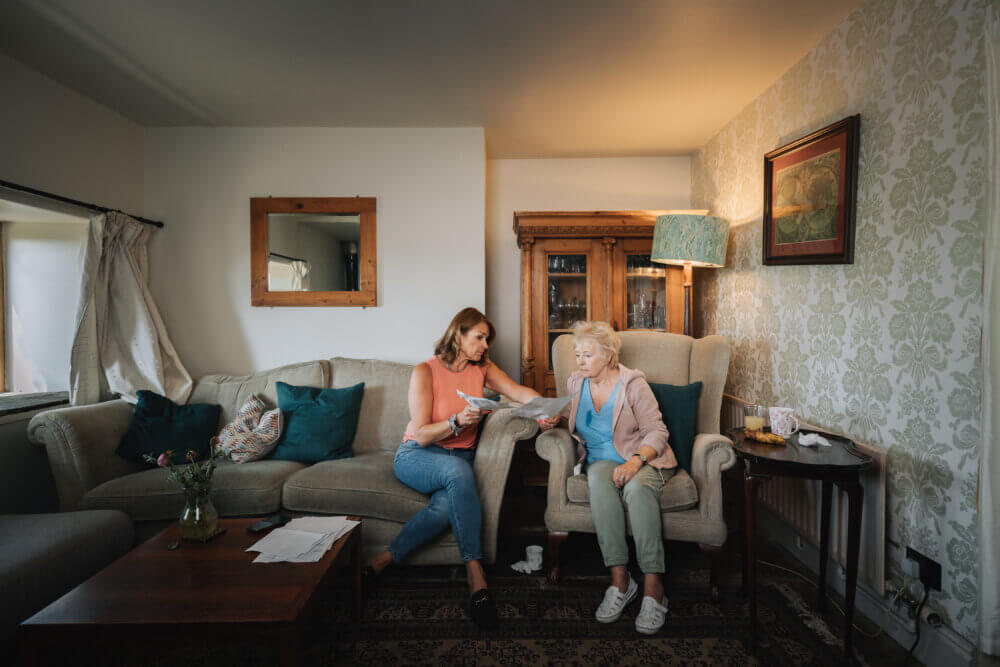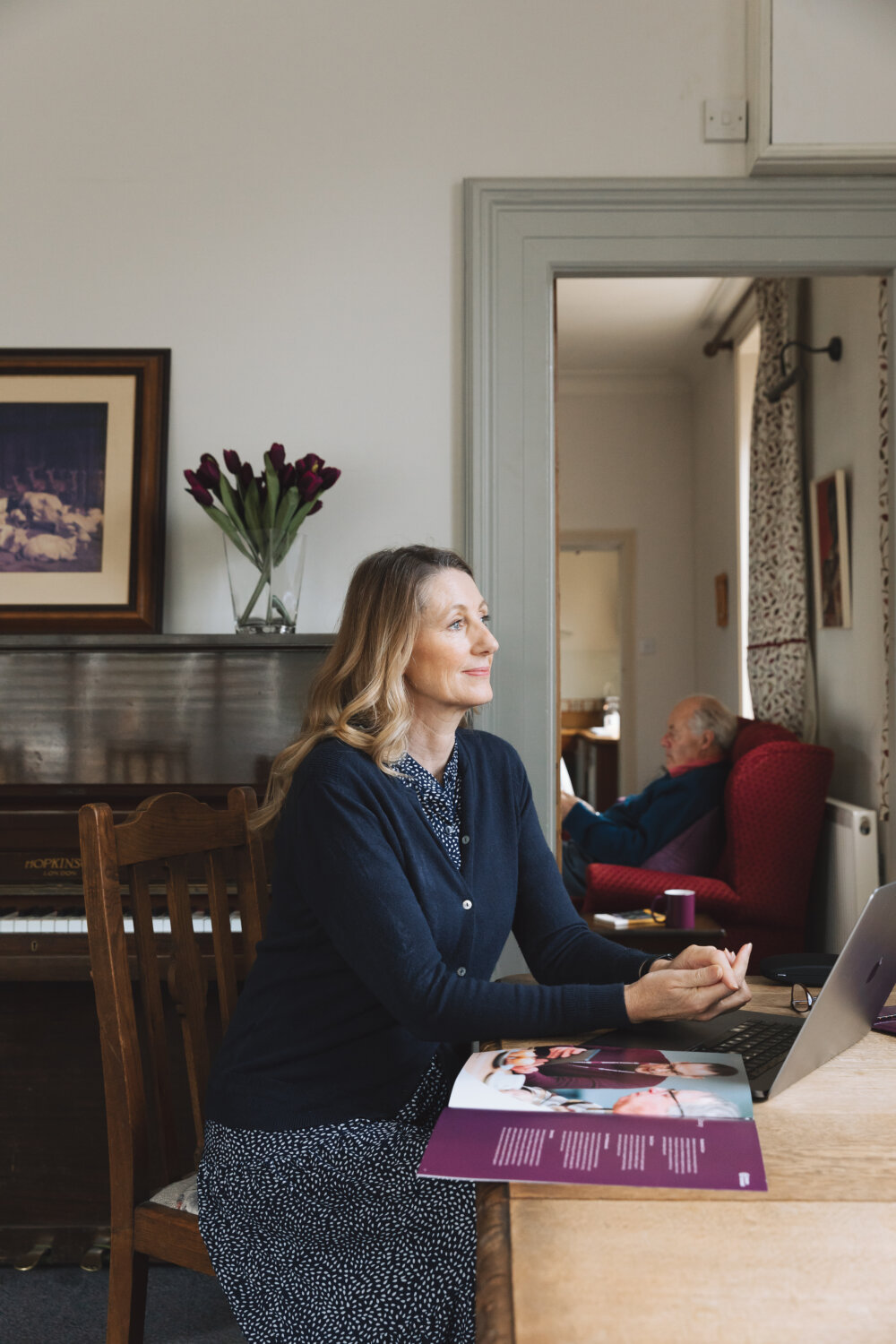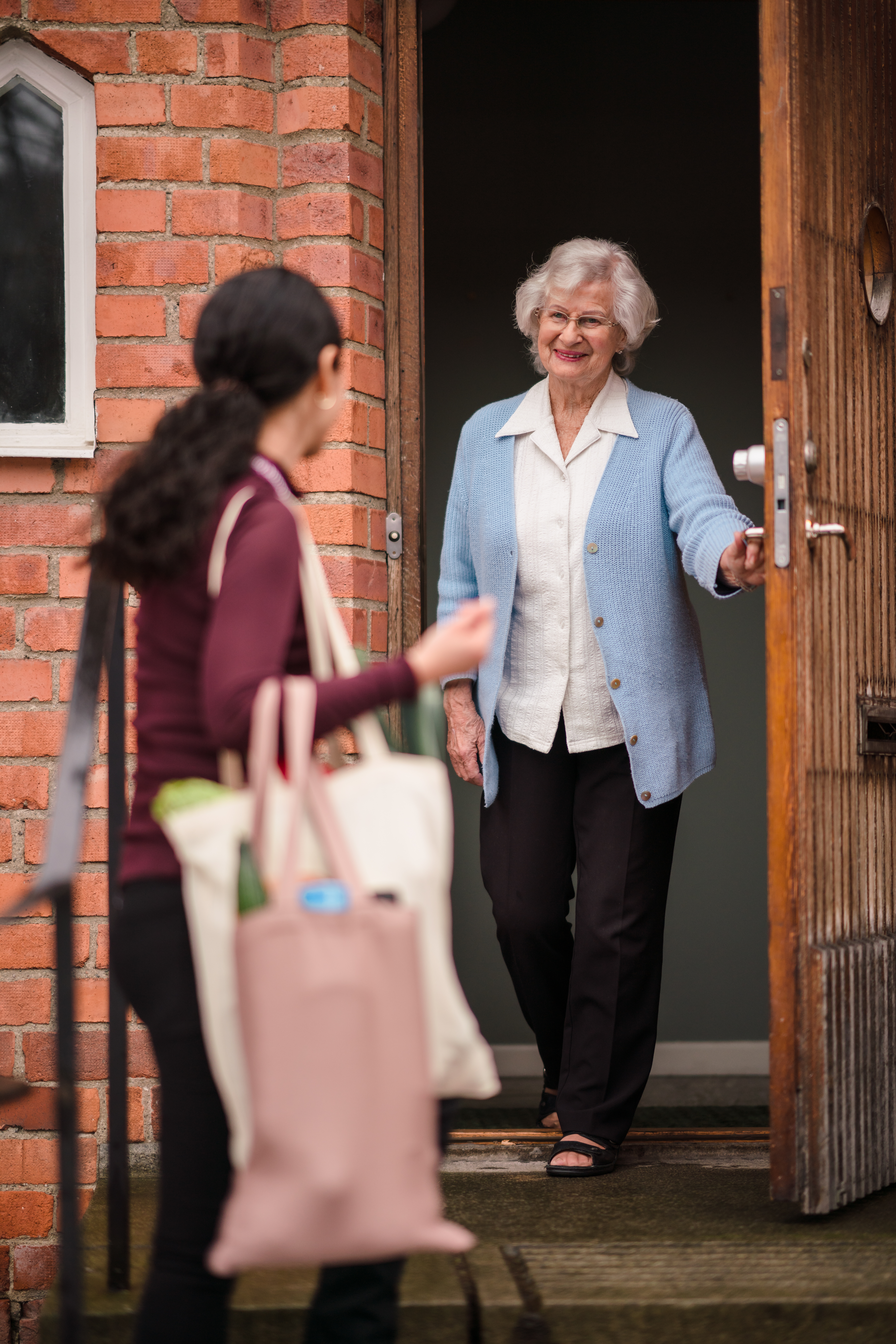What is dementia care?
Learn more about what dementia care is and some of the unique challenges it can pose.

If you or someone you love has recently received a dementia diagnosis, you may have questions about how to move forward and live with the condition. This is where dementia care comes into play, and we are here to help answer any questions you have about what this is and how it works.Dementia care is essentially a care package provided by experienced carers, specifically designed to help those with a dementia diagnosis who are finding it difficult to live on their own at home. Here, we will help you decide how to know when it is time to put care in place, explore the pros and cons of home care versus a care home, look at the average cost of dementia care here in the UK, find out how to organise respite care for those with dementia, and the things you should consider when looking for a dementia carer. At Home Instead, our aim is to help people age positively and in place by bringing expert care to their home. For nearly 20 years, we have been providing the highest standard of care, and creating industry-leading training programmes for our Care Professionals that are accredited by nursing and medical professionals. Today, we are the world’s largest global home care network, supporting over 100,000 older adults with personalised, tailored care at home. So whatever questions you have about dementia care, we can help.
What is dementia?
Dementia is an umbrella term used to describe a range of progressive neurological disorders that eventually impair cognitive function beyond what is expected from the normal ageing process. Symptoms of dementia can impact a person’s memory and reasoning skills. Over time, it can advance to a level which interferes with their ability to perform basic everyday tasks, and can also cause changes to their personality. Around 900,000 people in the UK live with dementia, and this number is predicted to rise to 1.6 million by 2040.The most common signs and symptoms of dementia include memory loss (forgetting recent events, names, or where they live), communication issues (they may struggle to find the right words to express themselves), impaired decision making, mood and personality changes, a lack of interest in activities that were once enjoyable, struggling to perform everyday tasks, and more. You can find more information about this condition in our articles: What Is Dementia? and The Different Types Of Dementia

Why do people with dementia require care?
If you or a loved one has a dementia diagnosis or has been living with the condition for a while, eventually the need for specialised care will become apparent. According to the World Health Organization, dementia is currently one of the leading causes of disability and dependency in older people around the world, so having bespoke care – whether that takes place at home or in a care home – is necessary to ensure the person with dementia remains in the best health possible, with their wellbeing prioritised. Although different types of dementia will deteriorate at different rates, over time all people with a diagnosis of a dementia condition will experience their health and cognitive function decline, which means specialised dementia care is key. Care is particularly important for those with dementia as they may be able to move around and look after themselves physically, but no longer have the mental capacity to make good decisions about their own care, and therefore could be causing damage to themselves or others if not cared for by a knowledgeable dementia care expert. When someone struggles with things like reasoning and communication skills, then everyday tasks like getting washed and dressed in the morning, or cooking food for themselves, become dependent on a caregiver. As dementia continues to deteriorate, daily supervision and care helps to stop the individual from hurting themselves or others, or becoming confused and frightened about their situation.
What is involved in dementia care?
Dementia can affect many areas of a person’s life, so dementia care needs to be a multifaceted approach that helps to address the many health and wellbeing needs of the person living with the condition. This might mean someone requires personalised help with day-to-day activities like:
- Getting washed and dressed
- Reminders to eat regular meals and help with cooking
- Medication management
- Help with housework and looking after pets when this becomes too difficult
- Mobility support if and when necessary
- Regular health check-ups, and coordinating other healthcare professionals
- Removing any potential hazards so the home space is safe
- Organising cognitive and physical activities to help maintain mental stimulation
- Emotional support as the condition progresses
Generally, dementia care requires an ability to provide companionship, create a safe and supportive environment, evolve communication strategies as communication needs change, have patience and empathy during tough times, and be there to support the person and their family through the emotional challenges that come with dementia. Cases of dementia are unique to each person and will continue to progress over time. It is important to keep ahead of the person’s individual condition changes and organise regular assessments and care plan adjustments to meet their health and wellbeing needs.

How do you know when it’s time to organise dementia care?
Often family members will opt to care for loved ones with dementia themselves, whether to save on cost or because they do not feel comfortable leaving their care in the hands of someone else. Many hours of care are provided around the world by family members, and in fact, according to the World Health Organization, in 2019 dementia conditions cost economies 1.3 trillion US dollars globally, and around 50% of this cost was attributed to care by informal carers who provide on average 5 hours of care every day.It is understandable in the early stages of dementia to feel that you may be able to handle things by yourself, or by working on a rotation with other family members. However, as dementia is a progressive disease, eventually further care is often needed – the question for most people is, when is the right time to arrange formal dementia care? It is extremely difficult to make the decision on when the time is right for a loved one with dementia to either be moved into a care home or to start receiving home care. You may have questions about who ultimately makes this decision if the person cannot make it themselves, where the person should live, and what level of care is needed. When making the difficult decision about what is in the best interest of the person with dementia, it can help to ask some of the following questions:
- Is it sustainable for you to provide all of the care the person needs while still prioritising their wellbeing?
- Can the person make the best decisions for their own care? (If the answer is no, you may find our article on How To Get Power Of Attorney For Ageing Parents helpful)
- What option (home care or a care home) would provide the most benefits for the person with dementia and for yourself if you are currently caring for them? (You will find pros and cons for both options later in this article)
- Have you had previous conversations with your loved one about what sort of care they would prefer? Or have they made this clear in a previous care plan?
- What option do you believe would make the person with dementia feel most content and safe?
- Do you have anyone else you can discuss the decision with in order to air your questions and concerns?
- How much has the person’s dementia deteriorated and in what space of time? (As many care homes will require the person to be added to a waiting list, understanding the rate of cognitive decline the person is experiencing can help with planning for a future care home entry)
- Can the person still live independently and safely? Or are you worried about their safety when at home on their own, or their safety outside of the house?
- Do they have complex medical needs (dementia or otherwise) that need to be regularly monitored?
How do you have a conversation about dementia with a loved one?
Discussing the need for dementia care with a loved one with the condition can be difficult, awkward and upsetting for everyone involved, but with some forward planning it can become more manageable and solution-focused. Above all, approaching a conversation about a loved one’s dementia takes a large amount of sensitivity and trying to understand what it feels like from their side. Here are a few tips on how to begin this discussion:
- Choose the right setting – Somewhere quiet and familiar is usually best, and try to set aside enough time for the discussion so you will not be interrupted part way through.
- Express your concerns – Focusing on your worries over their health and safety is the best way to begin, so they understand you are keeping their best interests at heart.
- Use gentle, positive language – This can help to keep the conversation calm and avoid any distress for the person with dementia.
- Provide examples of difficult times – Discuss times when the person may have experienced things like distress or memory issues, but never make this feel confrontational. Instead, focus on making sure they know you are there to support them in always feeling safe and confident.
- Ask them about their experiences – If they want to talk about it, encourage them to open up about times when they felt unsafe or uneasy, and genuinely try your best to understand how they are feeling.
- Be as patient as you can – Even if the conversation does not initially go the way you think it will, maintain patience. Remember, you may need to have the discussion more than once.
- Suggest professional advice – Let them know that it is important to get professional advice on their diagnosis in order to make sure they always receive the best care.
You may find our article on The Care Discussion useful for preparing for this conversation. Remember, the earlier you are able to have this discussion, the better. Often a person with dementia will need to move into a care home or start receiving specialist care due to an unexpected event like an accident, hospital admission, or their regular carer becoming ill. Having the conversation and deciding the person’s needs and wishes early can mean you avoid having to make last-minute, rushed decisions, and can instead focus on making more calm, considered choices without time pressure.
Why is person-centred care important for those with dementia?
At Home Instead, we focus on providing person-centred care, which means we put the person requiring care at the centre of the discussion in order to prioritise their quality of life, promote their wellbeing, and provide a sense of contentment, confidence and security. This is particularly important for those suffering from dementia conditions, since so much of their daily life can feel uncertain and frightening. Dementia is a completely unique condition for every individual, so each person will find themselves with their own set of care needs. By providing person-centred care, we can ensure their care is bespoke to them, prioritise their wellbeing, and even champion their desires and interests. We work hard to pair individuals needing care with the perfect Care Professional for their needs and personality, as well as taking time to fully understand their health condition, background, goals and more. By going the extra mile, our Care Professionals deliver a tailored care plan that encompasses everything the person needs and wants, while still respecting their dignity and preferences, and offering them more control over their own care.
What are the pros and cons of a care home for someone with dementia?
When deciding on the best way to approach the care needs of someone with dementia, understanding the pros and cons of each option can help to make the choice clearer. As many people will consider care homes as an option for a loved one with dementia, here are the potential benefits of moving a person with dementia to a care home:
- Someone with dementia might feel safer in a care home in case of emergencies, where there is specialised care from trained staff.
- There are many opportunities for social interaction within a care home, from multiple staff members to other residents.
- In a care home, there is 24-hour supervision which means you don’t need to worry about the person with dementia becoming confused or putting themselves in danger.
- Care homes often work to a set schedule and routine, which can be beneficial for those with dementia to give them structure.
- Care homes are regulated and assessed by the Care Quality Commission, which means residents can be assured that they are getting a good standard of care.
As with any choice, there are also downsides to someone with dementia moving to a care home. These include:
- A care home is not a familiar environment, which can be particularly stressful for someone with dementia who already feels confused.
- Moving to a care home means the person has less control over their own schedule and choices, which can also be distressing for someone with dementia.
- Living in a care home could mean less time spent with family, friends or pets.
- If someone with dementia lives with a partner who does not have the same care needs, moving to a care home could mean they are separated.
- Care homes can be one of the most expensive choices for care, and some people will not be able to afford a place in one. According to Age UK, a place in a care or nursing home costs on average £800 to £1,078 per week depending on where you live in the country and other factors.
- Care homes do not always offer the best choice for general health, as studies show that care home residents have an increased risk of experiencing acute hospitalisations, and also have an increased risk of infections.
You may find more helpful pros and cons on moving to a care home in our article: The Benefits Of Home Care vs A Care Home
What are the pros and cons of home care for someone with dementia?
Another option that proves to be very popular for those with dementia is to receive home care, which is when a trained professional carer (or several carers on rotation) will visit to provide all of the essential healthcare and companionship from the comfort of the person’s own home. Here are the pros of home care:
- The person can stay in their own, familiar environment which avoids the stress and disorientation of moving. Studies have found that for a person with dementia, being in an unfamiliar setting with strangers (like a care home) can foster feelings of stress, confusion and anxiety, so staying at home could be the best option for their mental health. A 2013 study also found those living with dementia at home experienced higher activity levels, quality of life, and felt more socially connected than those living in a care home, plus a further study found that after one month of home care, participants were less likely to develop acute confusion than those in care homes.
- Home care can provide an extremely personalised care plan that prioritises the person’s own needs and preferences.
- Family members and friends can visit more often and be more involved in their relative’s care if they remain at home.
- Home care can be easily adapted as the person’s needs change, which is likely to happen often in the case of dementia. Live-in care is also an option for someone who needs a lot of care throughout the night.
- With home care, a person with dementia can maintain full control of their routine and mealtimes, which can be beneficial and make them feel more settled.
- Home care can offer a more personal, intimate caregiver relationship.
- With home care, a person may still be able to attend local events and social gatherings, which may not be possible if living in a care home.
- A person with dementia might find it easier to maintain their hobbies and interests while still living at home.
- Home care can have positive effects on wellbeing and happiness. One study found patients getting home care experienced the same positive health outcomes 6 months later as those who were admitted to hospital, but saw higher levels of patient satisfaction.
- For those with pets, home care means a person with dementia can continue to be around their beloved animals which can help maintain their sense of wellbeing.
- Home care can be a more affordable option for many people depending on how many hours of care are required, as they only pay for the care they need rather than paying for a place in a care home when they do not yet need 24/7 care.
Although at Home Instead we wholeheartedly believe home care is the best option in many cases, particularly for those with dementia, there are downsides to this option too. These include:
- If a person with dementia requires constant supervision for their safety, home care may not be the most financially efficient option as a care home would provide 24/7 care (live-in care is also an option)
- For those providing home care for a family member, they may lack the professional knowledge and experience needed to provide the best care (there are expert dementia carers who can visit the home to offer this).
- If family members are caring for a person with dementia in their own home, they may experience burnout as the person’s condition progresses (in this instance, respite care can be a great option – more on this below).
- Home care may mean less social interaction than a care home would provide, however with forward planning, social visits and outings can be organised by carers.
- In a small number of cases, the home may not provide the ideal set-up to be considered safe and comfortable for someone with dementia (although many home adaptations can be made to change this if needed).
How much does home care cost for someone with dementia?
The cost of home care for someone with dementia in the UK varies greatly depending on the level of care required, and where in the country the person lives. Since dementia care often involves specialised training and experience, this can also influence the cost of care. The UK government actively aims to keep older people living at home for as long as possible, so there are a lot of support options in place for anyone who is interested in receiving care within their own home instead of moving to a care home. You can read more about the support you may be able to get in our guide to paying for care.At Home Instead, we can offer care on an hourly or daily basis, but in the case of a client with dementia, a tailored package of services is often the ideal way to ensure they receive the very best care for their exact needs. As an example, one of our clients who was living with mid-stage dementia required a package of specialist care for 14 hours per week, which cost them £490 per week. For more information on how much a package of dementia care might cost for your situation, feel free to reach out to our friendly team. You can read more about average costs in our dedicated guide to the cost of home care.Also, if a loved one with dementia eventually requires round-the-clock care, live-in care could be the best option. You can learn more about this in our article: How Much Does A Live-In Carer Cost?

Can you get respite home care for someone with dementia?
Yes, respite care is available to those caring for a loved one with dementia, and this could provide temporary relief for caregivers who may be struggling to keep up with increasing care needs as the condition advances. Researchers in the US found that 97-99% of patients and their caregivers had unmet dementia-related care needs, which shows the importance of caregivers taking regular breaks and holidays from their duties in order to continue providing the best care to their loved one, and to maintain their own mental health and wellbeing.
Trained professionals can offer respite care to take over assisting with daily activities, medication management and other needs, including ensuring the person with dementia remains safe and comfortable while their regular caregiver is away. Respite care offers the chance for regular caregivers to avoid burnout, maintain their own wellbeing, and attend to personal matters like events or holidays. This type of care can be arranged as a regularly scheduled break, or on an ad-hoc basis when needed.
You can read more about respite care in our article: The Role Of Live-in Respite Care
What should you consider when finding a dementia carer?
If you choose to pursue dementia care at home, there are a few ways you can go about finding a dementia carer:
- You may be assigned a dementia carer through your local council after going through the Care Needs Assessment.
- You can look to hire a dementia carer privately on behalf of your loved one using an Introductory Agency, but do keep in mind this means you will become an employer and be responsible for paying the carer yourself (you can read more about this option here: Introductory Agencies vs Managed Live-in Care Providers).
- You can employ a dementia carer through a managed agency like Home Instead. We will do background checks on your behalf, help match you with an expertly trained carer who can manage your loved one’s needs and take into account their personality and preferences, and organise respite care if and when their regular carer needs to take time off.

It can feel overwhelming to know where to begin when starting to organise a loved one’s dementia care, and with so many options, making decisions on their behalf can be difficult. Often the best place to begin is to speak to their GP about care needs at their current stage of dementia, and ask for recommendations on the next steps. You may find more helpful information in our dedicated article: How To Choose & Arrange Home Care Services
Home Instead is an award-winning home care provider and part of a worldwide organisation devoted to providing the highest-quality relationship-led care for older people in their own homes. Arranging care for yourself or your loved one shouldn’t be stressful, so whatever questions you would like answered, feel free to reach out to the Home Instead team to discuss your needs.

Tim Howell , Learning and Development Partner
For the past 16 years, I have been dedicated to the care sector, progressing from Care Professional to Care Manager, and later assuming roles such as Specialist Training Manager. Currently, as a Learning and Development Partner at Home Instead’s National Office, I develop and review training programs, collaborate with external organizations like the Alzheimer’s Society, and manage various impactful projects.
My passion for dementia care has guided much of my work, from engaging with advanced dementia support initiatives, such as those offered by the End of Life Partnership, to staying informed through events like the annual Dementia Summit. These efforts reflect my deep commitment to enhancing the care and quality of life for individuals living with dementia